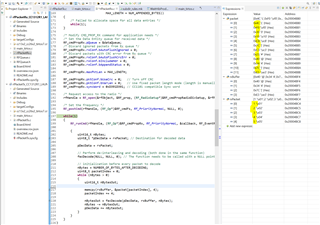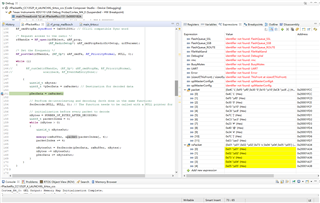Other Parts Discussed in Thread: CC1312R, CC1101,
1. 参考DN504 FEC Implementation 我们将源数据(0x01 0x02 0x03 0x04 0x05)进行FEC编码,得到:4C F0 30 10 C8 7C C3 23 40 34 7C E3;
2. 参考DN507 FEC Decoding 对上述编码数据进行解码,得到结果是:0x01 0x02 0x73 0x04 0x05, 与源数据不一致!
// NUMBER_OF_BYTES_AFTER_DECODING should be given the length of the payload + CRC (CRC is optional)
#define NUMBER_OF_BYTES_AFTER_DECODING 5
#define NUMBER_OF_BYTES_BEFORE_DECODING (4 * ((NUMBER_OF_BYTES_AFTER_DECODING / 2) + 1))
/*******************************************************************************
* @fn:
* @brief:
* @para:
* @return:
******************************************************************************/
void ReadRxFifo(uint8_t* rxBuf, uint16_t startAddr, uint16_t readLen)
{
// 01 02 03 04 05
const uint8_t rxRawData[] = { //
0x4C, 0xF0, 0x30, 0x10, //
0xC8, 0x7C, 0xC3, 0x23, //
0x40, 0x34, 0x7C, 0xE3, //
};
uint8_t iX;
for (iX = 0; iX < readLen; iX++)
{
if (startAddr + iX >= sizeof(rxRawData))
{
break;
}
rxBuf[iX] = rxRawData[startAddr + iX];
}
}
/*******************************************************************************
* @fn:
* @brief:
* @para:
* @return:
******************************************************************************/
void main(void)
{
unsigned short checksum;
unsigned short nBytes;
unsigned char *pDecData = rxPacket; // Destination for decoded data
uint16_t total = 0;
// Init MCU and Radio
while (1)
{
// while (!packetReceived)
// ; // Wait for packet to be received (64 bytes in the RXFIFO)
// packetReceived = 0;
memset(rxPacket, 0, sizeof(rxPacket));
pDecData = rxPacket;
// Perform de-interleaving and decoding (both done in the same function)
fecDecode(NULL, NULL, 0); // The function needs to be called with a NULL pointer for
// initialization before every packet to decode
nBytes = NUMBER_OF_BYTES_AFTER_DECODING;
total = 0;
while (nBytes > 0)
{
unsigned short nBytesOut;
// readRxFifo(RF_RXFIFO, rxBuffer, 4); // Read 4 bytes from the RXFIFO and store them in rxBuffer
ReadRxFifo(rxBuffer, total, 4);
nBytesOut = fecDecode(pDecData, rxBuffer, nBytes);
total += 4;
nBytes -= nBytesOut;
pDecData += nBytesOut;
}
// 运行到此处,rxPacket的内容是:01 02 73 04 05 (十六进制)
// Perform CRC check (Optional)
{
unsigned short i;
nBytes = NUMBER_OF_BYTES_AFTER_DECODING;
checksum = 0xFFFF; // Init value for CRC calculation
for (i = 0; i < nBytes; i++)
checksum = calcCRC(rxPacket[i], checksum);
if (!checksum)
{
// Do something to indicate that the CRC is OK
}
}
}
}


